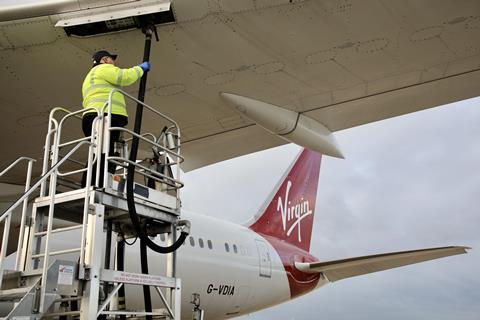Virgin Atlantic has highlighted the pressing need for investment in sustainable aviation fuel (SAF) production, as one of its Boeing 787s took off on what it describes as the world’s first transatlantic widebody flight to be fuelled by 100% SAF.
The non-commercial service by a Rolls-Royce Trent 1000-powered 787-9 – dubbed “Flight100” – departed London Heathrow late morning local time on 28 November en route to New York JFK airport.
The flight came just over a week after Pratt & Whitney Canada and Gulfstream said they had completed the first transatlantic flight powered by 100% SAF, using a G600 business jet.

Virgin says its flight is highlighting SAF’s status “as a safe drop-in replacement for fossil-derived jet fuel, compatible with today’s engines, airframes and fuel infrastructure”. It suggests the fuel can deliver CO2 lifecycle savings of up to 70% against jet kerosene and describes it as “the only mid-term viable solution for decarbonising long-haul aviation”.
But echoing the views of airlines around the world, as many work towards mandated levels of SAF useage by 2030 amid concerns about availability and cost, Virgin says current production levels fall well short of projected industry demand.
“There’s simply not enough SAF and it’s clear that in order to reach production at scale, we need to see significantly more investment,” says Virgin Atlantic chief executive Shai Weiss. “This will only happen when regulatory certainty and price support mechanisms, backed by government, are in place.
“Flight100 proves that if you make it, we’ll fly it.”
The SAF used on “Flight100” is a blend of 88% HEFA supplied by AirBP and 12% synthetic aromatic kerosene (SAK) supplied by Virent, Virgin states. The airline notes that the SAK is required in 100% SAF blends to “give the fuel the required aromatics for engine function”.
Alongside “proving the capabilities of SAF”, the flight will be used to study the non-carbon emissions, it says.
The flight follows a year-long collaboration by a Virgin-led consortium, which includes Boeing, Rolls-Royce, Imperial College London, the University of Sheffield, ICF and the Rocky Mountain Institute, in partnership with UK Department for Transport.
The airline needed to secure approval for the flight from regulators in the UK, Ireland, Canada and the USA.
Although low SAF availability – at around 0.1% of global jet fuel volumes today – makes it a moot point at this stage, commercial airline services are currently restricted by global fuel standards to a 50% SAF blend with jet kerosene, Virgin adds.
The G600 transatlantic flight took place on 19 November, with both of the business jet’s P&WC PW800 engines using 100% HEFA SAF on the Savannah to Farnborough service.


























